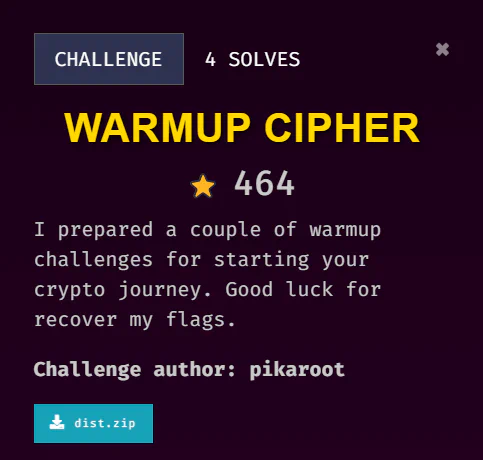Title here
Summary here

from hashlib import sha256
import string, random
from secret import MASTER_KEY, FLAG
from Crypto.Cipher import AES
from Crypto.Util.Padding import pad
SET = string.printable[:62] + '~!@#$%^&*'
def genRandpass():
master_key = int.from_bytes(MASTER_KEY, 'little')
randpass = ''
while master_key:
bit = master_key & 1
if bit:
randpass += random.choice(SET[:len(SET)//2])
else:
randpass += random.choice(SET[len(SET)//2:])
master_key >>= 1
return randpass
def main():
randpass = genRandpass()
encryption_key = sha256(MASTER_KEY).digest()
cipher = AES.new(encryption_key, AES.MODE_ECB)
ciphertext = cipher.encrypt(pad(FLAG, 16))
with open('out.txt', 'w') as f:
f.write(f'Your randpass : {randpass}\n')
f.write(f'Encrypted Flag : {ciphertext.hex()}')
if __name__ == '__main__':
main()Your randpass : v@BV4oHAbKP$hxK&qWDGysRAWHZJpj!zPW&Pkj^!&NEGq8&#EUQ~tlCIgZXzc3JQD*YJa1YYt#N&odTZASRGu5!UAWUItd*OfAFPqvZIkPIWb6U!jIT~nh%zO!V!w5T~BEXAab*A^EPP3gDYIRGGio$&>$exR^aFYAan@OKzJIxmz#RNTJejHPhC%B84FDYD%Kh1FHM@^B9jWKPXVB60OXTAE*d7~OGN%#yt~KCQIz23**FKD&5iWZ#&EMipK&~G&N7iFWRJRLv5K^%@*~pgINbG*CpyYSbJJRopQZDX@~5bVLzJFOoiQDERIM8xSMjIEGviGHlIJNj3IA%#MGa2^NoQC@7yA!l^TEvrHOD$P*yy@JE%zVfsI^2KZ%j1!GS^WAxuT*zCAPuaVNxUJQnhJ~CFNJ3cD$KJDDcq@AIL$BeuSCGMDL9fIF4E%Zpv&TeI%zvlMDaVF!a9PB4DBP66I%5@~Rce~C3Q!*jtTZo~T~2cA%cTIV5u~^lX!LhxQK#Z##swCFpG&GyiQKd~USm2CTb^Iz0qzYMzQTwkB#PRHIslUFM#S~dfNHc!SOlj&Ct@$IpbD&^X%Reu^J!HJXe0GJPzY&7rT#1@JEy1RP*@!Tv9BMpEzUy4UQ2$NIctM$jIIV08!!C^Z~23TUlNH@cxNXrLZVfnAV3MWYph
Encrypted Flag : 6159896fa4241f271807fb20645c98d03166742795e13a9904ca21df34c9fa7ee2721bffb5aa0ba60f9798edaa0c4684af558312db93c5d27c22ad3f778ff019This challenge involves the help of ChatGPT
import string
from hashlib import sha256
from Cryptodome.Cipher import AES
from Cryptodome.Util.Padding import unpad
# Provided randpass from out.txt
randpass = "v@BV4oHAbKP$hxK&qWDGysRAWHZJpj!zPW&Pkj^!&NEGq8&#EUQ~tlCIgZXzc3JQD*YJa1YYt#N&odTZASRGu5!UAWUItd*OfAFPqvZIkPIWb6U!jIT~nh%zO!V!w5T~BEXAab*A^EPP3gDYIRGGio$&>$exR^aFYAan@OKzJIxmz#RNTJejHPhC%B84FDYD%Kh1FHM@^B9jWKPXVB60OXTAE*d7~OGN%#yt~KCQIz23**FKD&5iWZ#&EMipK&~G&N7iFWRJRLv5K^%@*~pgINbG*CpyYSbJJRopQZDX@~5bVLzJFOoiQDERIM8xSMjIEGviGHlIJNj3IA%#MGa2^NoQC@7yA!l^TEvrHOD$P*yy@JE%zVfsI^2KZ%j1!GS^WAxuT*zCAPuaVNxUJQnhJ~CFNJ3cD$KJDDcq@AIL$BeuSCGMDL9fIF4E%Zpv&TeI%zvlMDaVF!a9PB4DBP66I%5@~Rce~C3Q!*jtTZo~T~2cA%cTIV5u~^lX!LhxQK#Z##swCFpG&GyiQKd~USm2CTb^Iz0qzYMzQTwkB#PRHIslUFM#S~dfNHc!SOlj&Ct@$IpbD&^X%Reu^J!HJXe0GJPzY&7rT#1@JEy1RP*@!Tv9BMpEzUy4UQ2$NIctM$jIIV08!!C^Z~23TUlNH@cxNXrLZVfnAV3MWYph"
# Character set used in the code
SET = string.printable[:62] + '~!@#$%^&*'
# Split the set into first half and second half
half_len = len(SET) // 2
first_half = SET[:half_len]
second_half = SET[half_len:]
# Reverse the process of generating randpass to get the MASTER_KEY bits
master_key_bits = []
for char in randpass:
if char in first_half:
master_key_bits.append(1)
elif char in second_half:
master_key_bits.append(0)
else:
raise ValueError("Character not in SET")
# Convert the bits back to an integer by reversing the bit order
master_key = 0
for bit in reversed(master_key_bits):
master_key = (master_key << 1) | bit
# Convert the integer MASTER_KEY to hexadecimal format
master_key_hex = hex(master_key)
# Print the derived MASTER_KEY in hex format
print("MASTER_KEY (hex):", master_key_hex)
# Encrypted flag from out.txt
encrypted_flag_hex = '6159896fa4241f271807fb20645c98d03166742795e13a9904ca21df34c9fa7ee2721bffb5aa0ba60f9798edaa0c4684af558312db93c5d27c22ad3f778ff019'
# Convert the master key from hex to bytes
master_key_bytes = master_key.to_bytes((len(master_key_hex) - 2) // 2, byteorder='little')
# Derive the encryption key using SHA-256
encryption_key = sha256(master_key_bytes).digest()
# Convert the encrypted flag from hex to bytes
encrypted_flag_bytes = bytes.fromhex(encrypted_flag_hex)
# Decrypt the flag using AES in ECB mode
cipher = AES.new(encryption_key, AES.MODE_ECB)
decrypted_flag_padded = cipher.decrypt(encrypted_flag_bytes)
# Remove padding to get the original flag
decrypted_flag = unpad(decrypted_flag_padded, 16)
# Print the decrypted flag
print("Decrypted Flag:", decrypted_flag.decode())This encryption script basically uses a master key to encrypt the flag. The genRandpass() function generates a random password based on the master key, while The main() function uses a random generated password to encrypt the flag using AES. The variable named SET defines the characters used for random password generation.
Therefore, we deduce that we can the MASTER_KEY by reversing the genRandpass() function as we already have the random password. This is because the password is generated by shifting through the bits of the MASTER_KEY. For each bit:
SET.SET.